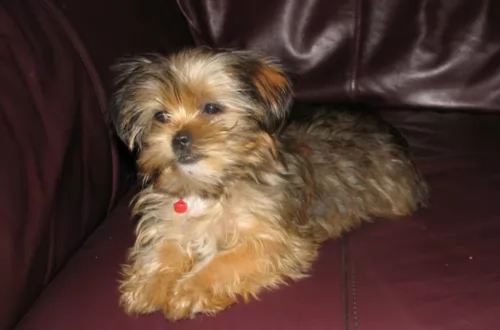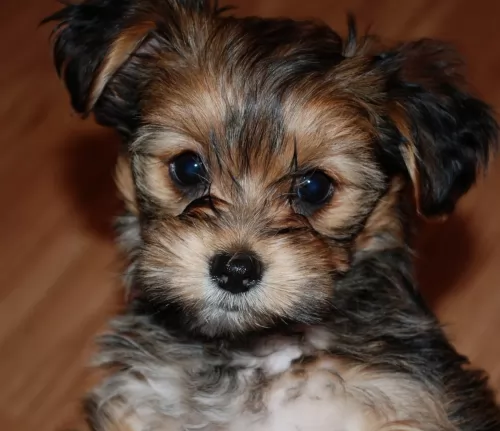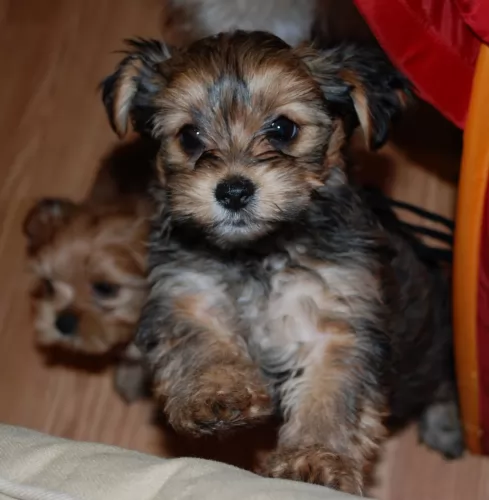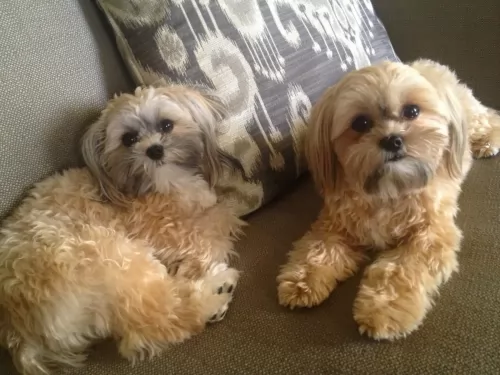 Petzlover
Petzlover Eurohound is originated from Norway but Shorkie is originated from United States. Eurohound may grow 48 cm / 19 inches higher than Shorkie. Eurohound may weigh 17 kg / 38 pounds more than Shorkie. Both Eurohound and Shorkie has same life span. Eurohound may have more litter size than Shorkie. Eurohound requires Low Maintenance. But Shorkie requires Moderate Maintenance
Eurohound is originated from Norway but Shorkie is originated from United States. Eurohound may grow 48 cm / 19 inches higher than Shorkie. Eurohound may weigh 17 kg / 38 pounds more than Shorkie. Both Eurohound and Shorkie has same life span. Eurohound may have more litter size than Shorkie. Eurohound requires Low Maintenance. But Shorkie requires Moderate Maintenance
 Sled dog racers wanted something unique and hardy in their dogs and the Eurohound seemed to be the dog that fitted the bill.
Sled dog racers wanted something unique and hardy in their dogs and the Eurohound seemed to be the dog that fitted the bill.
It was in the 1980s that both Norway and Sweden started crossing the Husky and the Pointer for the first time.
The Eurohound, known also as the Scandinavian hound, is a cross between a German Shorthaired Pointer and an Alaskan Husky as well as other Pointer dogs.
Hailing from Norway, Scandinavia, it isn’t a purebred dog but a cross-breed, and the term ‘Eurohound’ comes from a certain Ivana Nolke so as to distinguish the European racing dogs imported into Alaska.
 The Shorkie is a mix between a Yorkshire Terrier and a Shih Tzu. This little dog actually thinks he’s quite big. He is a great watchdog and a barker, and he is a loyal and loving member of his family. He will let you know if he thinks something is going on that shouldn’t be.
The Shorkie is a mix between a Yorkshire Terrier and a Shih Tzu. This little dog actually thinks he’s quite big. He is a great watchdog and a barker, and he is a loyal and loving member of his family. He will let you know if he thinks something is going on that shouldn’t be.
This hybrid combines two breeds known for their good looks, cuteness and personalities. Shorkies get their watchdog instincts and their loyalty to their people from the Shih Tzu and their personalities and good looks from the Yorkie. This designer breed has no known standard and every puppy is different, but traits from its founding breeds will remain. Both breeds have great personalities.
Regardless of the differences within the litter, because the personalities and adorableness of the two founding breeds are equal, all of the puppies will have those characteristics. They will all be energetic, playful and think they are big dogs. They will all love people and especially kids – playing and watching over them.
The Shorkie is intelligent, trainable, and snuggly. They will also have the stubborn trait that the two founding breeds can show at times. Developed in the United States, this crossbreed is extremely popular even though they have been in existence for only ten years or so. Breeders in the U.S. began to mix these two breeds in order to develop a cute, friendly and intelligent little dog that will cuddle on your lap – perfect lap dog.
Even if we already have breeds similar to the Shorkie, its development allows breeders to diversify and improve the genetics of the dogs. It is important that these be responsible breeders whose intentions are not financial but to legitimately improve the positive traits of each breed while sorting out the undesirable or weak traits. This is the positive side of the new designer breeds.
Even though it is still being developed, at least the Shorkie seems to be a success story for designer breeds as a loving, popular little dog. It will take a lot more time and a lot more development before the Shorkie becomes an actual recognized breed. At the moment it remains a hybrid, a crossbreed, a so called designer dog.
It will be at least 7-10 generations of careful and quality breeding before the Shorkies are potentially recognized as its own pedigree breed. It is important to breed Shorkies to Shorkies in order to develop a standard that could be accepted for a new breed by the AKC and UKC. Over time the puppies must become more and more standardized in their conformity to that new breed standard. Their physical appearance and their temperament will be standardized. At this stage the second generation of Shorkies is rare. Their popularity is rising in the United Kingdom. Both Britain and Ireland have a growing interest in this hybrid.
 The Eurohound is a carefully bred dog considered to be a large dog standing up to 72 cm in height and weighting in the region of 18-24 kg.
The Eurohound is a carefully bred dog considered to be a large dog standing up to 72 cm in height and weighting in the region of 18-24 kg.
With its mission being to be a sled dog, it is constantly being crossbred with other cross- breeds to produce dogs to suit the pulling of sleds. Because both the Husky and Pointers have been used in its breeding, who knows really how its appearance will be as it can vary quite a bit.
There are however, some common features in the dogs such as the half dropped ears. More Eurohounds have black ears with white markings. The dog is a slender breed with a longish face and a long muzzle. Certainly it is known for being a powerful sled dog. The short, shiny dog can be in a number of colors such as cream, beige white, red, black, spotted or patched.
Social, extrovert and energetic, the Eurohound also loves to be busy. Its a dog who forms a strong relationship with its owners, being affectionate and loyal. While he is quite able to live in the city or the country, he essentially needs large premises as he loves to run and be free.
He most certainly isn’t a working dog breed who can be left on his own in the backyard until you need him to pull a sled as he craves your companionship. He is an independent and stubborn dog and therefore training and socialization will b excellent for him as it makes him understand who is boss in the home.
He is a dog who gets on well with other pets in the home as well as children.
 The Shorkie, being a cross between the Yorkshire Terrier and the Shih Tzu, and as such has physical and temperament characteristics from both breeds. They could be 50-50 but most likely each puppy will be more like one of the founding parents than the other. Because there is a lot of similarity between the founding breeds there is a lot of similarity between the Shorkies.
The Shorkie, being a cross between the Yorkshire Terrier and the Shih Tzu, and as such has physical and temperament characteristics from both breeds. They could be 50-50 but most likely each puppy will be more like one of the founding parents than the other. Because there is a lot of similarity between the founding breeds there is a lot of similarity between the Shorkies.
Their hair is either wavy or straight, but it is soft. It can be a wide variety of colors and usually they have a darker mask on the face. Usually they have the eyes of the Shih Tzu – large -but not protruding. Their muzzle is short, and the skull is round with triangle ears. Their bodies are compact, small with plenty of muscle for their size. They also have fine bones and short legs, with a thin curled tail.
 Full of bounce, social and extroverted, while also being independent and stubborn, the Eurohound just loves being around his human family, bonding strongly with them, whether they are adults, children or even other pets in the home.
Full of bounce, social and extroverted, while also being independent and stubborn, the Eurohound just loves being around his human family, bonding strongly with them, whether they are adults, children or even other pets in the home.
You’ll find that your Eurohound is an intelligent dog too and that he can be easily trained. He loves to be active, so to put him in your backyard and all but forget about him would be cruel. They are loyal, loving dogs who want to be part of all your activities, being ready to walk and run with you whenever the opportunity arises.
 Considered as a healthy dog breed and able to live up to 10 – 15 years of age, just some of the most common reported health problems you might find with your Eurohound are hip and elbow dysplasia.
Considered as a healthy dog breed and able to live up to 10 – 15 years of age, just some of the most common reported health problems you might find with your Eurohound are hip and elbow dysplasia.
Hip dysplasia is where the joint – the ball and socket – is malformed so that instead of working smoothly it grinds. It is one of the most common skeletal diseases in dogs and large breeds are mostly affected. Hip dysplasia can lead to osteoarthritis, pain and lameness.
 Many hybrids are in better health at least genetically than their parent breeds. Responsible breeders will breed any genetic issues out of their puppies. Still there are many health issues that the Shorkies are prone to. These include:
Many hybrids are in better health at least genetically than their parent breeds. Responsible breeders will breed any genetic issues out of their puppies. Still there are many health issues that the Shorkies are prone to. These include:
• Brachycephalic Airway Syndrome – “smashed face” causes problems with breathing, heat, flying and more.
• Glaucoma – Yorkshires have this, and it can be secondary to the lens Luxation.
 The Eurohound is an energetic dog who will require a high-quality nutritious food. Home made dog foods are wonderful but in the event that it isn’t always possible, make sure you buy top quality commercially manufactured food.
The Eurohound is an energetic dog who will require a high-quality nutritious food. Home made dog foods are wonderful but in the event that it isn’t always possible, make sure you buy top quality commercially manufactured food.
Your vet can advise you on the type of food to use for your pet if you are unsure. Certainly, if you feed your dog kibble, take a good look at the ingredient label on the pet food packaging. If you are interested in your dog’s health in terms of food, you will learn about protein/fat ratio and how much moisture is in the food and what vitamins are included.
Remember to occasionally include cooked brown rice, vegetables and chicken as well as some raw meat from time to time.
The Eurohound isn’t a big shedder but you will still need to ensure that you brush his short coat twice a week to keep it in tip top condition.
These are dogs which bond closely with their human family so this grooming period will be therapeutic to him.
Check his ears inside and out for the development of ear infections and brush his teeth twice a week with a special dog toothbrush and tooth paste. Dental disease can cause a host of serious illnesses and you want to avoid this with your dog,
 1.Feeding the puppy - The Shorkies need a high-quality, well-balanced dry kibble. Make sure it is a formula for small, active dogs. It should have lean meat and essential minerals and vitamins. Make sure it is puppy food not adult. The puppy needs 300 -550 calories a day in 3 meals.
1.Feeding the puppy - The Shorkies need a high-quality, well-balanced dry kibble. Make sure it is a formula for small, active dogs. It should have lean meat and essential minerals and vitamins. Make sure it is puppy food not adult. The puppy needs 300 -550 calories a day in 3 meals.
2.Feeding the adult – Obesity is a problem for the Shorkie as it is for many small dogs. Don’t overfeed your adult but give her the same kind of high quality small breed dog food, only for adults. They need about 200-300 calories a day in 2 meals.
4. Games and Exercises – These are very active little dogs and need exercise every day. They needs walks, games, and time with you. They also love to cuddle with you at the end of the day. They love squeaky toys and playing fetch outside or inside.